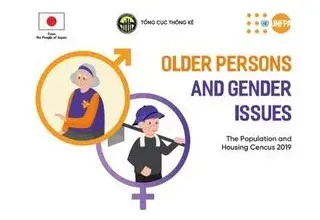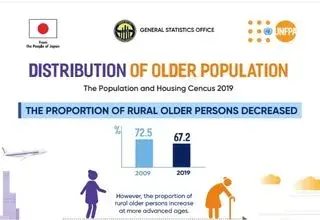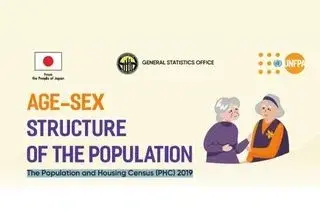- Mr. Đỗ Xuân Tuyên, Vice Minister of Health
- Dr. Suwit Wibulpolprasert, Chair of ASEAN Center for Active Ageing and Innovation Board Members
- Mr. Nguyen Doan Tu, Director General of the General Office for Population and Family Planning, Ministry of Health;
- Representatives from the Government’s ministries and agencies of Vietnam;
- Representatives from the Embassies of ASEAN member states to Vietnam;
- Representatives from the Embassy of Japan to Vietnam and from the Japan International Cooperation Agency (JICA);
- Representatives from UN agencies and international and national organisations;
- Representatives, participants from ASEAN member states participating online
- Media representatives;
Good morning!
I would like to express my sincere appreciation to the Government of Vietnam as Vice Chair of the ASEAN Centre for Active Ageing and Innovation, for inviting UNFPA to jointly organise today’s event, International Workshop on Active Ageing, Innovation and Application of Digital Technology in Care for Older Persons in ASEAN.
We are very honoured to provide technical and financial support to this workshop together with the Government of Japan and the Mitsubishi Research Institute. The workshop presents an opportunity for ASEAN Member States to promote cooperation and share experience, so that older persons are part and parcel of the country’s sustainable development process, and achieve active and healthy ageing in the digital transformation era.
Dear participants,
Population ageing is a global phenomenon and one of the greatest demographic changes on the planet today. Older persons are growing in almost every country. In 2020, there were nearly 727 million people aged 65 years and above, accounting for 9.3% of the total population in the world. This number will more than double by 2050, reaching over 1.5 billion persons, accounting for 16% of the world's population.
In ASEAN, there are more than 45 million people aged 65 years and above, accounting for 7% of the total population of the region. It is projected that by 2050, nearly 17% of the total population in ASEAN will be older persons. Meanwhile, Viet Nam is one of the most rapidly ageing countries in the world. In 2019, the number of older persons was 7.4 million, accounting for 7.7% of the total population. And it is projected that by 2036, Vietnam will transition from an “aging” to an “aged” country, and the number of older people aged 60 and above will reach 21.3 million people, which is almost one fifth of the total population.
For older population groups, there were more women than men. In 2019, the proportion of women was 54% in the 60-64 age group, and 65% in the 80-and-above age group. It means that we do need to take note of "feminization of aging."
Also, we do need to take note of "feminization of poverty." Women work in lower wage jobs than men despite the fact that the number of working hours and education levels are similar between men and women. At the same time, the time women spend on housework is twice as much as that of men, especially during COVID-19 pandemic, women spend on average 30 hours per week on housework, according to ILO 2021report 2021.
Population ageing brings both opportunities and challenges in terms of socio-economic development. It can create new markets such as health insurance, finance, banking, health care, nutrition, tourism, etc. Last week, UNFPA in collaboration with the Vietnam Chamber of Commerce and Industry, and with financial support from the Government of Japan, organised the first ever business forum for Viet Nam on the opportunities for the development of business services for older persons. The forum was attended by more than 150 representatives from national and international companies, who all agreed that the domestic service market for the elderly is very promising with 20 million "potential customers" by 2035. The forum explored national strategies which can be put in place for the private sector to maximise the gain from population ageing, and “finding Gold in the Silver economy.”
Population ageing can present challenges as well in various areas, especially in health care sector. Older people often have multiple non-communicable diseases, requiring life-long treatment such as blood pressure, cardiovascular disease, diabetes, systematic disorders, etc. And the situation becomes worst when the COVID-19 pandemic broke out. Globally, its consequences have revealed that in crisis and emergency situations, fragilities and weaknesses are exposed particularly in vital service provisions that impact on the most vulnerable segments of the population.
Vietnam is no exception. Ho Chi Minh City and many other provinces and cities in Vietnam have been hit by the 4th wave of the COVID-19 pandemic this year, causing the negative impacts on the country’s socio-economic development. The pandemic has had devastating effects on older people and put a spotlight on the health and rights of older persons in society. While the virus spreads among persons of all ages, older persons and those with underlying medical conditions are at increased risk of developing severe conditions and having higher death rates.
Dear Participants,
Both population ageing and digitalization are part of the world’s Mega Trends which we all have to respond to. Digital technology is continuing to reshape the way we access health information and care services. The COVID-19 pandemic has only made the trend more visible: digital access has become a new social determinant of health. More than ever, the ability of older people to use digital technologies may affect their health status and quality of life.
Technology application could ensure the uninterrupted health information and care services for older persons, especially those with underlying health problems. Digital communications play important roles in reducing loneliness and enhancing social connectedness, an issue which has received growing policy attention during the COVID-19 pandemic, because social distancing and confinement measures have affected the elderly population, leading to social isolation.
In this context, UNFPA is proud to share our experience in telehealth care for older persons, through our technical support to the Ministry of Health. It is the very first mobile application for older persons in Vietnam called “S-Health.” You will hear more about this application later today, but I would like to emphasize that S-Health was developed to promote healthy and active aging in partnership with Vietnamese young people. UNFPA advocates for a life-cycle and intergenerational approach to ageing, so as to meet the needs of older persons and also prepare younger populations into old age toward healthy and active aging.
We need to take an action now. While there is no single comprehensive policy that can address population ageing, we must invest in forward-looking, rights-based and gender-transformative policies that focus on the needs of people at every age of their life. In so doing, countries in the ASEAN community can aspire to, and achieve, a better future for all, where no one is left behind for the achievement of SDGs.
Thank you very much for your attention and participation!





